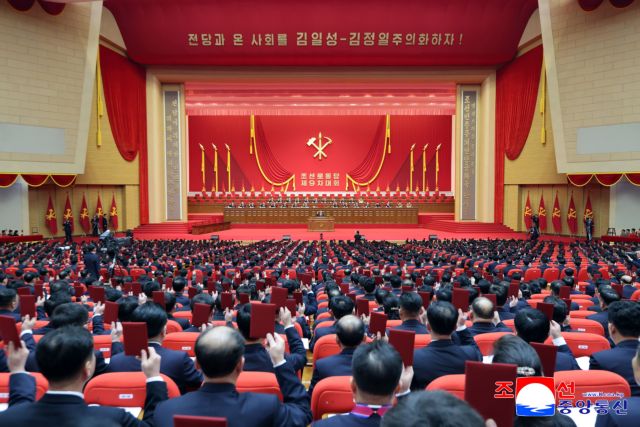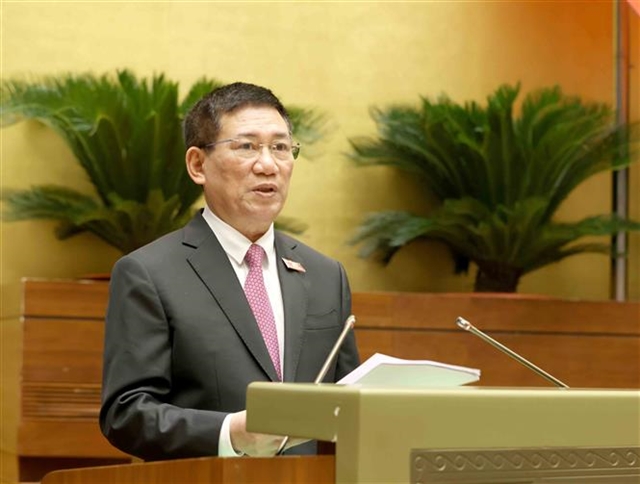 Politics & Law
Politics & Law


|
| Deputy Prime Minister and Minister of Finance Hồ Đức Phớc presenting the report on the 2024 State Budget performance, the 2025 budget estimates, the central budget allocation plan and the 2025-2027 financial and budgetary plan at the National Assembly's 8th session on Tuesday. VNA/VNS Photo |
HÀ NỘI — Deputy Prime Minister and Minister of Finance Hồ Đức Phớc announced that the projected State budget deficit for 2024 is VNĐ399.4 trillion (US$15.7 billion), equivalent to 3.6 per cent of GDP.
For 2025, he urged ministries and agencies to strive for a ten per cent reduction in recurrent spending, compared to 2024, to further reduce the budget deficit.
Presenting the report on the 2024 State Budget, the 2025 budget estimates, the central budget allocation plan and the 2025-2027 financial and budgetary plan at the National Assembly's 8th session on Tuesday, the Deputy PM shared that the projected State budget revenue for 2024 is more than VNĐ1.7 quadrillion.
By the end of September, 85.1 per cent of the target had been achieved, representing a 17.9 per cent increase compared to the same period in 2023. The full-year estimate is expected to reach VNĐ1.8 quadrillion, up 10.1 per cent from the projected target.
Despite significant disruptions to several revenue streams following Typhoon Yagi, the Ministry of Finance implemented measures to ensure the budget's timely collection, with 85 per cent of the target achieved in the first nine months.
Domestic revenue is estimated at over VNĐ1.57 trillion, exceeding the forecast by 8.9 per cent. Crude oil revenue reached VNĐ59.3 trillion, surpassing the estimate by 28.9 per cent and revenue from trade and customs activities is projected at VNĐ235.2 trillion, 15.3 per cent above the target.
Regarding State budget expenditures, the 2024 allocation is set at VNĐ2.1 quadrillion, with 59.3 per cent of the total spent in the first nine months. The full-year expenditure is expected to reach VNĐ2.2 quadrillion, 7.7 per cent higher than the original estimate.
Looking ahead to the 2025 budget, the projected allocation is VNĐ1.96 quadrillion, a 15.6 per cent increase over 2024. The mobilisation rate into the budget is set at 16 per cent of GDP, with domestic revenue accounting for VNĐ1.6 quadrillion, or 85 per cent of total revenue.
These projections are viewed positively, given the persistent economic and social risks both domestically and internationally. The budget deficit for 2025 is forecast at over VNĐ471 trillion, or 3.8 per cent of GDP.
By the end of 2025, public debt is expected to be between 36-37 per cent of GDP, with government debt at 34-35 per cent, remaining within the limits authorised by the National Assembly.
To support the Government’s initiative to eliminate substandard housing for low-income and near-poor households, Deputy PM Phớc proposed using five per cent of the recurrent spending savings from 2024, both from the central and local budgets.
Additionally, any unspent savings from 2024 would be allowed to roll over into 2025 for continued use in this programme. Localities will be permitted to allocate their savings towards supporting other regions in implementing this initiative.
In 2025, to ensure sufficient funding for public sector salaries, in addition to budget allocations and salary reserves, Deputy PM Phớc proposed an additional adjustment to local budget estimates by more than VNĐ200 trillion, with an estimated VNĐ14 trillion allocated to local areas.
To ensure efficient budget management in 2025, Deputy PM Phớc urged ministries and agencies to strive for a ten per cent reduction in recurrent spending compared to 2024, to reduce the budget deficit and increase funds for critical tasks and public investment.
The estimated recurrent spending for local budgets is VNĐ828.6 trillion, ensuring the funding of socio-economic development tasks according to the decentralisation plan.
During the review of the report on the 2024 State Budget performance, Lê Quang Mạnh, Chairman of the National Assembly’s Finance and Budget Committee, recommended that ministries and sectors continue to enhance the quality of forecasts when developing future budget estimates.
Regarding the 2024 annual report, he noted that 11 localities had not met their budget estimates and urged them to continue striving to increase revenue and cut unnecessary expenditures. He also suggested using contingency funds to ensure that the 2024 budget targets are met.
On the disbursement progress of development investment, the review report called on the Government to continue directing ministries and localities to expedite the implementation process in the remaining months of the year, ensuring that disbursement stays on track. Specific and decisive measures tied to the accountability of agency heads were recommended to meet disbursement commitments.
Regarding budget spending, the Finance and Budget Committee found that spending levels were appropriate, especially given the need to address several unexpected tasks in 2024 and to ensure the increase in the base salary from July 1, 2024, as per regulations. — VNS




